Wed, June 02, 2010 | Intelligence and Terrorism Information Center
An overview of the Ship Intifada to the Gaza Strip
Overview
During the night of May 31 IDF forces took control of the aid flotilla to the Gaza Strip. Five ships were taken without exceptional incident. On the sixth ship, the Turkish vessel Mavi Marmara, the IDF soldiers met with violent resistance. The pro-Palestinian activists on board the ship, which had been sent by the Turkish Islamist organization IHH, attacked the soldiers with clubs, knives, stones and other cold weapons. At one point the activists grabbed two pistols from Israeli soldiers and shot at them.
After 40 minutes of violent skirmishes, and in view of the danger to their lives, the soldiers were given authorization to open fire. During the confrontation nine of the ship’s activists were killed, and seven IDF soldiers and about 40 activists were wounded. All the vessels were towed to the port of Ashdod and their passengers were taken for questioning.
The Flotilla to the Gaza Strip – (as of June 1, 2010)
The Main Events
On May 30, as the flotilla approached the eastern Mediterranean shore, three Israeli Navy vessels were dispatched from the port of Haifa. They were joined on the high seas by patrol boats from the port of Ashdod and naval commando speedboats. The first contact with the flotilla occurred at 2230 hours that night. The navy hailed the ships in English several times and ordered them to sail to the port of Ashdod, to unload the equipment on board and transport it to the Gaza Strip though the proper channels. The flotilla’s organizers made it clear that they had no intention of cooperating. When they did not answer the call or heed the warnings, at 0400 hours the soldiers, armed primarily with riot control equipment, began taking control of the ships (IDF Spokesman, May 31; see video).
Five of the six ships in the flotilla cooperated with the IDF forces. They were towed to the port of Ashdod and their passengers were taken off the ships unharmed. On the sixth ship, the flotilla’s flagship, the Turkish Mavi Marmara, the IDF forces met with violent resistance. The activists on board attacked them with clubs, knives and guns. One of the soldiers, who was on board the ship and wounded during the confrontation, said that the activists had attempted to lynch him and his comrades in arms. He said every soldier was forcibly held by three or four men and beaten. He said the activists were armed with clubs, metal pipes, knives, slingshots and bottles. At one point they grabbed two guns from IDF soldiers and shot at them (IDF Spokesman, May 31, 2010).
Forty minutes after control had been taken of the first ship, and after the assault on the IDF soldiers (one of whom was seriously wounded), and in view of the danger to their lives, the soldiers were given authorization to use live ammunition (Haaretz, June 1, 2010). Seven IDF soldiers were wounded, two of them seriously. Nine activists were killed and 40 were wounded. The confrontations aboard the ship lasted throughout the day.
In the evening, after the IDF forces took control of the ship, it was towed to the port of Ashdod. The activists on board were then taken off the ship for questioning. Once all the activists had been removed, security forces searched the ship. They found large quantities of cold weapons which had been prepared in advance for a confrontation with the IDF. Among the weapons were dozens of knives, Molotov cocktails, detonators, metal pipes, clubs, slingshots and stones, large hammers, wrenches and sharp metal objects. Gas masks were also found.
Israeli Defense Minister Ehud Barak, Chief of Staff Gabi Ashkenazi and Navy Commander Eliezer Marom held a press conference at which they described the events. According to Ehud Barak, before the flotilla set sail Israel asked the organizers to transport the aid via Israel after a security check. He said that all Israel’s requests were denied. Gabi Ashkenazi said that in light of the events, there was no connection between the flotilla and peace activists or humanitarian assistance. He said it was a case of extreme premeditated violence planned for the soldiers the moment they boarded the ship.
Initial Responses to the Events
The events surrounding the flotilla, especially the violent confrontation on board the Mavi Marmara, were well covered by the media. Israel, faced with what was clearly political-propaganda provocation, was severely criticized by the Palestinians, the Arabs and the international community. Many European countries requested clarification from the Israeli ambassadors regarding the results of the operation. The UN Security Council held a meeting to discuss the events and possible responses. Turkey’s reaction was particularly strong, while the United States and Britain were more reserved. Initial responses were the following:
Hamas
Hamas exploited the events for a propaganda attack on Israel, demanding that the international community condemn Israel and end the so-called “siege” of the Gaza Strip. Throughout the Strip protest marches and demonstrations were held. The main rally was held in the Gaza port and attended by thousands of Gazans, including Ismail Haniya, head of the de facto Hamas administration, and other members of the Hamas leadership (Al-Risala, Qudsnet website, May 31, 2010).
Some Hamas reactions:
- Ismail Haniya held an emergency meeting of the administration to discuss the implications of the event. Participants at the meeting called on the Palestinian Authority to stop the proximity talks with Israel (Al-Jazeera TV, May 31, 2010).
- Khaled Mashaal, head of the Hamas political bureau in Damascus, currently visiting Yemen, demanded that the Western countries and the international community make a “brave decision to break the siege of the Gaza Strip” (Yemeni News Agency, May 31, 2010).
- Sami Abu Zuhri, Hamas spokesman, called on the Arab League to hold an emergency meeting to formulate “practical steps” and declare a “breaking of the siege” of the Gaza Strip, and to open the Rafah crossing once and for all. He also called on the League to announce it was cancelling negotiations with Israel (Hamas’ Palestine-info website, May 31, 2010).
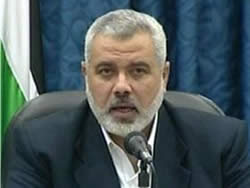
Ismail Haniya, head of the de facto Hamas administration, at an emergency administration meeting (Hamas’ Palestine-info website, May 31, 2010)
The Palestinian Authority
The Palestinian government held an emergency meeting chaired by Mahmoud Abbas. It was determined that immediate international and regional action had to be taken which would force the international community to take responsibility to “restrain the cruel piracy which broke international laws and conventions.” The government’s announcement called on all the relevant factors (i.e., Hamas) to take responsibility and sign the Egyptian reconciliation document, noting that “the end of the [internal Palestinian] schism is the most effective answer to Israel’s activities” (Wafa News Agency, May 31, 2010).

Emergency meeting of the Palestinian government chaired by Mahmoud Abbas (Wafa News Agency, May 31, 2010)
Other reactions:
- Salam Fayyad, Palestinian prime minister, called on the international community to condemn the attack on the flotilla and work to lift the “siege” of the Gaza Strip. He also called on Hamas to respond positively to efforts to achieve a national reconciliation (Wafa News Agency, May 31, 2010).
- Saeb Erekat, chief PLO negotiation, was interviewed by Radio Sawt al-Quds. Asked if the time had not come to reexamine the continuation of direct or indirect negotiations with Israel, he answered that in any case, the talks were not being held with Israel, but with the United States (Radio Sawt al-Quds, May 31 2010).
The Arab League
The Arab League strongly condemned the “terrorist action carried out by the Israeli forces of occupation,” and called on the international community to “take steps to deter this rogue state, which carries out every terrorist action possible and creates tension and unrest in the region and in the heart of the Mediterranean Sea” (Arab League website, May 31, 2010).
Iran
The IDF’s action against the flotilla was widely covered by the Iranian media. At every level, spokesmen for the regime called on the international community to take a stand against Israel:
- Iranian president Mahmoud Ahmadinejad, currently visiting Indonesia, declared that supporting the oppressed Palestinian people was the most important responsibility of Muslims and of all humanity. He said that it had been proved that “the Palestinian issue was not an Arab or Islamic issue, but a global issue” (ISNA, May 31, 2010)
- Said Jalili, chairman of the Supreme National Security Council, accused Israel of committing “war crime,” and said that the attack proved that “the peace program of Barack Obama, the president of the United States, is a fraud” (ISNA, May 31, 2010).
- Alaa al-Din Boroughjerdi, chairman of the Foreign Policy and National Security Committee of the Majlis (the Iranian Parliament), said that the attack by the “Zionist regime” on the “Gaza freedom flotilla” was a confrontation with the world, and therefore the world had to mobilize against it (ISNA, May 31, 2010).
- Hashemi Rafsanjani, Chairman of the Expediency Discernment Council and Assembly of Experts, demanded that the Islamic countries and those which defended human rights throughout the world respond to the “audacity of the Zionist regime and take steps to liberate the oppressed Palestinian people, especially those in the Gaza Strip” (ISNA, May 31, 2010).
- Ahmad Vahidi, Iranian defense minister, who was involved in the attack on the Jewish community center building in Argentina in 19941, strongly condemned what he called “the barbaric attack on the freedom flotilla by the Zionist regime.” He said that “with the barbaric assault on the freedom flotilla, Israel began the countdown to its own destruction” (Fars News Agency, Iran, May 31, 2010).
The International Community
The United States
American President Barack Obama expressed deep regret over the operation and stressed the importance of investigating all the facts (A.P., May 31, 2010). Philip Crowley, American State Department spokesman, said that the United States “deeply regrets the tragic loss of life and injuries suffered among those involved in the incident…[and] was working to ascertain the facts, and expect that the Israeli government will conduct a full and credible investigation.”2 He added that the United States supported importing goods into the Gaza Strip through the border crossings and in consideration of Israel’s legitimate security concerns in the spirit of cooperation, not confrontation (American State Department website, A.P., May 31, 2010).
Turkey
Turkey’s responses to the incident were particularly severe. On May 31 the Turkish government held an emergency meeting attended by the deputy prime minister and the foreign minister to discuss the implications for the relations between Turkey and Israel. The chief of staff of the Turkish army cut his visit to Egypt short (Reuters, Al-Manar TV, May 31, 2010). The deputy prime minister said he was recalling the Turkish ambassador from Israel along with the youth football team, which was also in the country. He also announced the cancellation of three planned joint Israeli-Turkish military exercises (A.P., Reuters, May 31, 2010).
The heads of the Turkish government were extremely critical:
- Tayyip Erdogan, Turkish prime minister, called the Israeli action “terrorism under the aegis of an inhuman country.” He said that if Israel had “chosen to side with terrorism and bloody operations, Turkey would choose to side with law, peace, justice, Palestine and the Gaza Strip” (Antalya News Agency, June 1, 2010).
- Bulent Arinc, deputy Turkish prime minister, condemned Israel and called its action “piracy.” However, he rejected the idea of deploying Turkish war ships in the Mediterranean in response (A.P., Reuters, May 31, 2010).
- Ahmet Davutoglu, Turkish foreign minister, condemned the Israeli takeover of the ships and claimed that Israel had again demonstrated its contempt for human life and peaceful intentions. He said the event might have results which could not be rectified, and that Israel would have to bear the consequences. Speaking before the UN Security Council, he expressed surprise that the IDF would attack a civilian force carrying humanitarian assistance to the Gaza Strip in international waters. He also said it was a breach of international law, and that the IDF’s use of force was inappropriate and excessive (trt-world.com, June 1, 2010).
On May 31 thousands of demonstrators flocked to the Israeli consulate in Istanbul. They waved Palestinian flags, wore green headbands bearing the inscription “We are all Palestinians,” and shouted slogans from “Stop military collaboration with the Israeli army” to “Kill all the Israelis.” In the afternoon several demonstrators climbed over the barriers and shouted “Allah akbar,” “Death to the Jews” and “Attack Israel.” In the late evening there was a large demonstration organized by the Islamic movement and attended by thousands who flocked to the area of the Israeli consulate. Tens of thousands of young men and women wearing kafias and hijabs (traditional male and female Islamic head coverings) stormed the metro (Haaretz, May 31, 2010).
NATO
A spokesman for NATO said in an announcement that in response to a demand from Turkey, an emergency meeting of its 28 member countries would be held at NATO headquarters in Brussels on June 1. He said that the organization was “deeply worried” by the loss of human life (Agence France-Presse, May 31, 2010).
The UN
Ban-ki Moon, UN secretary general, called for a broad investigation of the events to determine exactly how the bloodshed occurred. He said it was urgent for Israel to provide a full explanation (Reuters, May 31, 2010). A UN aide reviewed the events and called for an investigation, saying that the incident could have been prevented if Israel had acceded to the international demand to lift the siege of the Gaza Strip (PressTV, May 31, 2010). The UN Security Council passed a resolution condemning Israel (Ynet, May 31, 2010).
Europe
Catherine Ashton, European Union foreign minister, called on Israel to carry out a “full investigation” (Agence France-Presse, May 31, 2010).
Angela Merkel, German chancellor, said that she had spoken to the Israeli and Turkish prime ministers and expressed her deep concern at the event (Agence France-Presse, May 31, 2010).
Ulrich Wilhelm, spokesman for the German government, claimed that the German government was “shocked” by the event. He said that “every German government supports unconditionally Israel’s right to self defense,” but that Israeli actions should to correspond to what he described as the “basic principle” of proportionality”3 (Reuters Alertnet, May 31, 2010).
Bernard Kouchner, French foreign minister, expressed “deep shock” at the tragic consequences of the incident and claimed that nothing could justify “such violence” and the price in blood of a humanitarian enterprise which had been known for a number of days. He called for an investigation without delay (Agence France-Presse, May 31, 2010).
Another Ship Expected to Reach the Gaza Strip and Plans for Another Flotilla
The Rachel Corrie, which set sail from Ireland and was supposed to join the flotilla, was delayed by technical problems. On May 31 it set sail from Palermo and is expected to reach the Gaza Strip between June 2 and 3. It is carrying “peace activists” and members of European parliaments.
Hamas-affiliated groups have announced that preparations are being made to organize another flotilla to the Gaza Strip, and that it will set sail within a number of weeks:
- Majid al-Zayir, head of the “Center for Palestinian Return,” said that “the international campaign to break the siege of the Gaza Strip” had begun making preparations for a new flotilla, which would take place in the coming six weeks, as “a sign of solidarity with the Gaza Strip and to challenge Israel’s threats” (Qudspress website, May 31, 2010).
- Jamal al-Khudari, chairman of the Popular Committee to Lift the Siege (one of the people responsible for coordinating the arrival of the flotilla in the Gaza Strip) called for a popular intifada and said that “as of right now real preparations are being made for more ships to come in the future, some of them larger and with more equipment and senior figures” (Al-Aqsa TV, May 31, 2010).

A poster calling for a continuation of the “intifada of the ships” (Al-Hayat Al-Jadeeda, May 31, 2010)
Important Events
Developments in the Gaza Strip
Increase in Rocket Fire
This past week there was an increase in the amount of rocket fire from the Gaza Strip into Israeli territory. A total of seven rocket hits were identified in the western Negev (five of them on May 26). The rockets fell in open areas. There were no casualties and no damage was done. Several other rockets were fired but fell inside the Gaza Strip. A network calling itself the Night Rider Squads of the Al-Aqsa Martyrs Brigades claimed responsibility for the May 29 rocket attacks (Fatah forum, May 30 2010).
On May 25 an IDF force identified a suspicious Palestinian driving a wagon close to the security fence. After he distanced himself from the wagon, which was apparently booby trapped, it exploded. There were no casualties.
On the morning of June 1 an IDF force identified two terrorist operatives who crossed the security fence in the southern Gaza Strip. During the ensuing exchange of fire the terrorists were killed.
Rockets and Mortar Shells Fired into Israeli Territory4
Rocket Fire 2010, Monthly Distribution5
Israeli Air Force Response
In response to the rocket fire, Israeli Air Force planes attacked a number of terrorist targets in the Gaza Strip:
- On May 25, the IAF hit an assault tunnel in the area of Beit Hanoun in the northern Gaza Strip.
- On May 29, the IAF hit a site for manufacturing weapons in the southern Gaza Strip.
- On May 29, the IAF hit five buildings in the Dahaniya airfield (central Gaza Strip).
The Palestinian media reported that there were no casualties but the serious damage was done to property (Safa News Agency, Qudsnet, May 30 2010)
Hamas’ Counterterrorism Activities
Sources within the Popular Resistance Committees reported that Hamas’ security services were undertaking activities to prevent PRC operatives from firing rockets into Israeli territory. They reported the following:
- Seven operatives belonging to the military wing of the Popular Resistance Committees were detained. They had tried to abduct IDF soldiers in the Nahal Oz area (northern Gaza Strip) (Fatah forum, May 29, 2010).
- Twenty operatives belonging to the PRC were detained on suspicion of firing rockets into Israel and setting fire to an UNRWA summer camp.6 According to PRC sources they had in fact fired rockets, but they denied setting fire to the camp (Al-Sharq al-Awsat, May 30, 2010).
Judea and Samaria
The Israeli security forces continued their preventive counterterrorism activities his past week. Concurrently, rioting continued in various locations in Judea and Samaria.
This past week there was an increase in stones thrown at Israeli vehicles. One civilian Israeli woman sustained minor injuries:
- May 30 – Stones were thrown at an Israeli vehicle northeast of Hebron. There were no casualties but the vehicle was damaged (IDF Spokesman, May 30, 2010).
- May 29 – Stones were thrown at an Israeli vehicle southeast of Qalqilya. An Israeli woman sustained minor injuries (IDF Spokesman, May 29, 2010).
- May 29 – A 12-centimeter (4.7”) knife was found among the tools of a Palestinian at a checkpoint west of Ramallah (IDF Spokesman, May 29, 2010).
- May 28 – Stones were thrown at an Israeli vehicle southwest of Bethlehem. There were no casualties but the vehicle was damaged (IDF Spokesman, May 28, 2010).
- May 27 –Molotov cocktails were thrown at an Israeli vehicle southwest of Bethlehem. Stones were thrown at Israeli vehicles south of Hebron and south of Bethlehem. There were no casualties but the vehicles were damaged (IDF Spokesman, May 27, 2010).
- May 27 – A knife was found on the person of a Palestinian at a checkpoint east of Tulkarm (IDF Spokesman, May 27, 2010).
- May 26 – Stones were thrown at an Israeli vehicle south of Bethlehem. There were no casualties but the vehicle was damaged (IDF Spokesman, May 26, 2010).
Notes:
- Ahmad Vahidi, Iran’s defense minister, was involved in the attack on the AMIA building in Argentina in 1994. For further information see the August 30, 2009 bulletin, “The report issued by the Argentinean Attorney General regarding the suicide bombing attack at the AMIA building in Buenos Aires in 1994 in which Ahmad Vahidi, Iran’s new designated defense minister, played a central role” at Terrorism-info Iran 019.
- state.gov.
- alertnet.org.
- The statistics do not include the mortar shells fired at IDF soldiers patrolling the border fence which fell inside the Gaza Strip.
- Rocket hits identified in Israeli territory. A similar number misfire and customarily land inside the Gaza Strip.
- For further information see the May 27 bulletin, “Educating the younger generation in the Gaza Strip: summer camps organized by UNRWA in “competition” with Hamas, are a target for threats and assaults. Armed men recently torched an UNRWA summer camp. Hamas condemned the event but minimized its importance, advising UNRWA to change its ways” at Terrorism-info 106.



 RSS
RSS

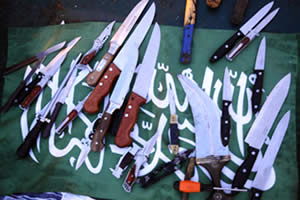
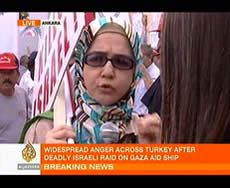


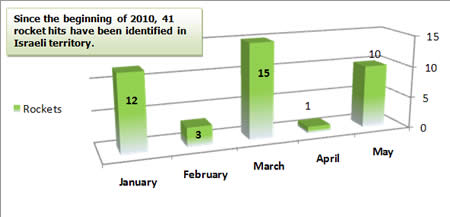


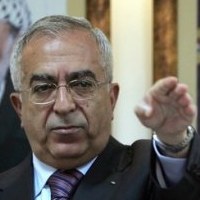
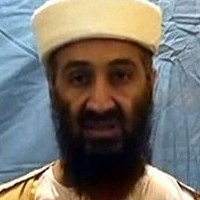









The Ship Intifada: an Overview #israel #gaza #flotilla #jcot #tcot #jihad #hamas #IHH http://bit.ly/9DlPtb
RT @CrethiPlethi: The Ship Intifada: an Overview #israel #gaza #flotilla #jcot #tcot #jihad #hamas #IHH http://bit.ly/9DlPtb
[…] This post was mentioned on Twitter by Jo Ellen Davey Cohen, Crethi Plethi. Crethi Plethi said: The Ship Intifada: an Overview #israel #gaza #flotilla #jcot #tcot #jihad #hamas #IHH http://bit.ly/9DlPtb […]
[…] Link: The Ship Intifada: an Overview | Middle East Affairs Information … […]